Japan on the mentality of China complex: the need for immigrant labour feared competition | Japan | | workers _ China News
 File photo: Tokyo street. Tokyo Tower in response to "Earth Hour" initiative to turn off the lights.
File photo: Tokyo street. Tokyo Tower in response to "Earth Hour" initiative to turn off the lights.Foreign media said Japan Prime Minister Shinzo Abe's Office recently suggested that the plans filed a motion to introduce more foreign workers, dealing with declining national labour situation. Move again revealed Japan facing the demographic challenge concerns. Rapidly ageing population decline and lead Japan a severe shortage of workers, particularly in the construction industry. Japanese construction known as the "3K" industrial--kitanai (dirty), kiken (dangerous) and kitsui (hard), described the difficult working conditions, which further exacerbated the industry's labor shortage. Japan young men unwilling to set foot in the industry, according to estimates in the next few years Japan China will need more than 25,000 construction workers.
According to the Japan foreign scholars, November 15, because the national labour cannot meet the demand for jobs, many construction companies turned to foreign labor markets to fill the vacancies, most of them migrant workers from China. Japan in principle does not accept low-skilled temporary workers, immigration authorities nor foreign workers to work in lower-skill work visas, Japan business technology internship program introduction on behalf of workers. The program allows foreign-trained technical staff (also known as trainees) in manufacturing, agriculture and construction sectors were short-term "training". Under this plan, foreigners can get a three-year term of training and internship visa. Some critics argued that the plan was however only foreigners as "slave labour" exploitation tools, however, many Japan enterprises continue to use that system bringing in cheap labor from abroad.
One way to solve the labor shortage is to make foreign workers hired as regular employees. Employees enjoy long-term stable employment protection, is responsible for the employee's salary, bonus and other benefits, should cover the employees ' medical insurance, pensions and unemployment insurance. In return for job security, regular employees must take more responsibilities and duties than other forms of employee, require hard work and devotion, loyalty to the company.
Reports said although Japan employees and foreign workers will benefit from this post arrangement, Japan opened the door to foreign workers in order to maintain economic growth practices will encounter major challenges. It is well known that Japanese have their own unique cognitive and cultural homogeneity is proud, in the pursuit of cultural uniqueness follows precise atmosphere creates difficulties for policy makers. Recognition of different cultural practices need to Japan Society to introduce major changes. To solve this problem, however, requires Japan adhere to the policy of diversification, effective protection of the rights of migrant workers against exploitation. But is unable to guarantee that Japan Government is ready to accept foreign workers policy.
Reports, interview Japan Manager in construction enterprises and Chinese laborers found, is one of the main difficulties faced by foreign workers into Japan culture. Because Japan single single language, culture, and Japan society are unwilling to accept the different cultures of the foreigners, so integration is a complex task.
However, the Japanese want foreigners into Japan culture, if the foreign worker does not meet the "Japan" have to put up with criticism. Foreign workers are in many ways by Japanese standards, this conceals the fact that Japan lacks the understanding and respect of cultural diversity. For example, Chinese workers on the linguistic and cultural habits are different from the Japanese, so I can't expect them to fully integrate into Japan society.
There is evidence that Japanese foreign workers lack trust. General Contracting Company will be specified in the contract, it cannot be used for certain types of foreign workers on the construction site, because Japan construction quality managers do not believe that foreign workers and Japan as well as workers.
Reported that unfortunately, the prejudice against migrant workers to jobs had a negative impact on the environment. Many Japan employees also worry that these foreign workers will eventually become their competitors. For example, some Japan craftsmen skilled migrant workers bear the relevant type is not allowed. This fear of competition led to migrant workers were assigned low level, low skill requirements. Chinese workers expressed frustration about this in an interview, saying they tend to lose interest in work in six months, because they are eager to learn more things, but there's no chance.
Foreign workers are now Japan one of the most challenging issues facing. Policy makers wish to solve the social problems caused by low birth rates and labour shortages. Change the social customs and values for a long difficult, but Japan business and society it is time to rethink issues associated with immigrant workers, complementary legislation, regulations, to help deal with the challenges of cultural diversity, so that the foreign workers to Japan make a long-term contribution. (End)
Source: references
Responsible editor: Wei chun
Article keywords:Japan workers labour workers in China
I want feedback
Save a Web page
Dragonsoft
日本对中国工人心态复杂:需要外来劳动力又怕竞争|日本|工人|中国工人_新闻资讯
 资料图片:东京街景。图为东京塔响应“地球一小时”倡议熄灯。
资料图片:东京街景。图为东京塔响应“地球一小时”倡议熄灯。 外媒称,日本首相安倍晋三办公室的官员们日前提出,计划提起议案引进更多外国劳工,应对本国劳动力日益减少的局面。此举再次透露日本面对人口挑战的担忧。人口数量下降和快速老龄化导致日本劳动力严重短缺,尤其是在建筑行业。日本人把建筑业称为“3K”产业——kitanai(肮脏)、kiken(危险)和kitsui(辛苦),形容工作条件艰苦,这种看法进一步加剧了行业劳动力供应不足。日本年轻人不愿涉足这个行业,而据估计,未来几年日本中国范围将需要超过2.5万名建筑工人。
据日本外交学者网站11月15日报道,由于本国劳动力无法满足岗位需求,许多建筑企业目光转向外国劳务市场填补空缺,其中大部分外来工人来自中国。日本原则上不接受低技能的临时工,移民部门也不向从事低技能工作的外来工人发放工作签证,因此日本企业就利用技术实习培训计划的名义引进工人。该计划允许外国技术受训人员(也叫研修生)在制造业、农业或者建筑业部门进行短期“研修”。按照这个计划,外国人可以得到期限三年的培训和实习签证。然而有人批评该计划只是把外国人当“奴隶劳工”盘剥的工具;尽管如此,许多日本企业仍在继续利用这项制度从海外引进廉价劳工。
解决劳动力短缺的一个方法就是把外国工人聘为正式员工。正式员工享有长期稳定就业的保障,企业负责员工的月薪、奖金以及其他福利,应该涵盖员工的医疗保险、养老金以及失业险。作为工作保障的回报,正式员工必须比其他形式的雇员承担更多责任和义务,要求全身心投入工作,忠于公司。
报道称,尽管日本员工和外国员工都将从这种岗位安排中获益,但日本为了维持经济增长向外国工人打开大门的做法也会遇到重大挑战。众所周知,日本人对自己的独特认知和文化同质性十分自豪,在追求文化独特性上遵循旧例的氛围为决策者制造了困难。认可不同文化习俗需要日本社会作出重大改变。然而要解决这个问题,需要日本坚持多元化政策,切实保护外来工人的权益不受盘剥。但目前无法保证日本政府已准备好施行接纳外国工人的政策。
报道称,通过采访一些日本建筑企业经理和中国劳工发现,外国员工面临的主要困难之一就是融入日本文化。由于日本语言单一、文化单一,而且日本社会也不愿接受外国人的不同文化,因此融入是一个十分复杂的任务。
然而,日本人希望外国人融入日本文化,如果外国工人的行为不符合“日本方式”,就不得不忍受指责。外国工人在许多方面被按日本人的标准要求,这就隐瞒了一个事实,那就是日本缺少对多元文化的理解和尊重。例如,中国工人在语言文化习惯上都不同于日本人,因此不能指望他们完全融入日本社会。
此外还有证据表明,日本人对外国工人缺少信任。一些总承包公司甚至会在合同中明确规定,建筑工地的某些工种不能使用外国工人,因为日本经理不相信外国工人的施工品质能与日本工人一样好。
报道称,不幸的是,这些对外来工人的偏见给工作环境造成了负面影响。许多日本员工还担心,这些外国工人最终会成为自己的竞争对手。例如,一些日本工匠不允许技术熟练的外来工人承担相应工种。这种害怕业务竞争的心态导致外来工人被指派低水准、低技能要求的工作。中国工人在接受采访时对这种情况表达了无奈,说他们往往在六个月后就对工作失去了兴趣,因为他们迫切希望学到更多东西,但就是没有机会。
外来工人的问题是如今日本面临的极具挑战的问题之一。决策者希望解决因出生率低和劳工短缺而导致的社会问题。改变长久以来形成的社会习俗和价值观困难重重,但日本企业和社会现在是时候重新思考与外来劳工有关的问题,补充立法、制定制度,帮助应对文化多元性挑战,以便外国工人为日本作出长期贡献。(完)
来源:参考消息
责任编辑:隗俊
文章关键词: 日本 工人 中国工人 劳工
我要反馈
保存网页
华龙网